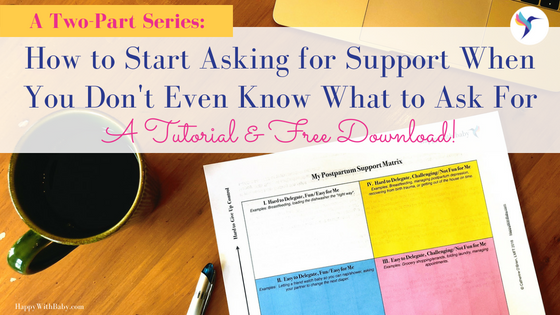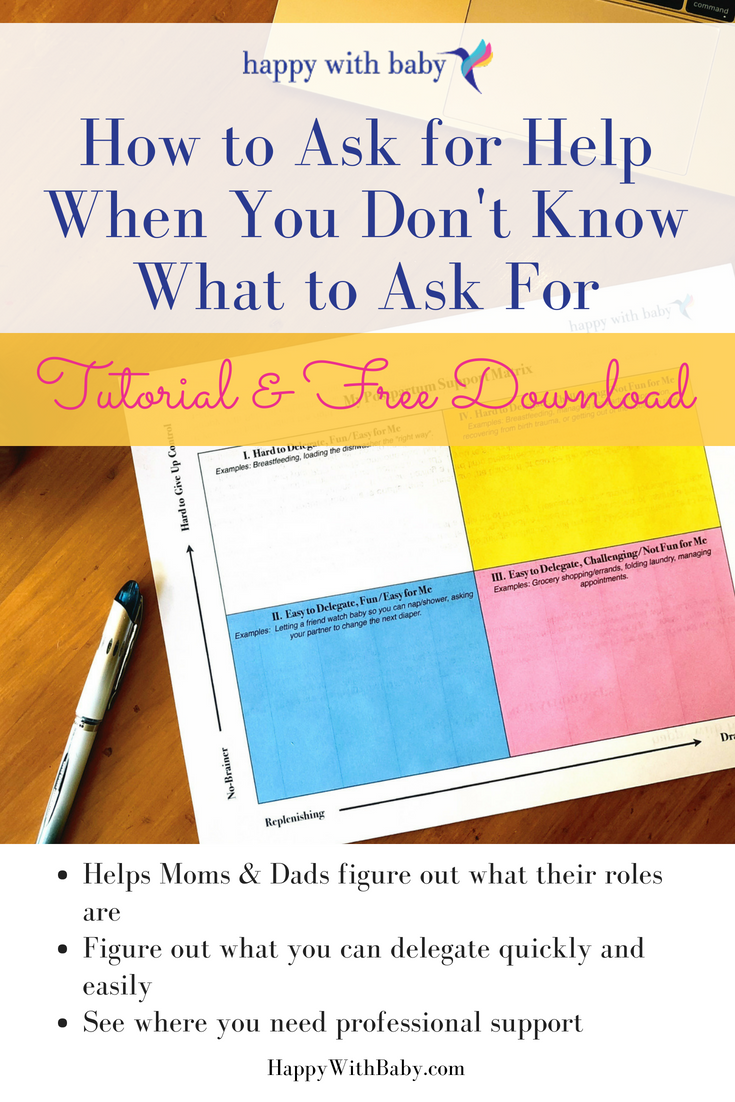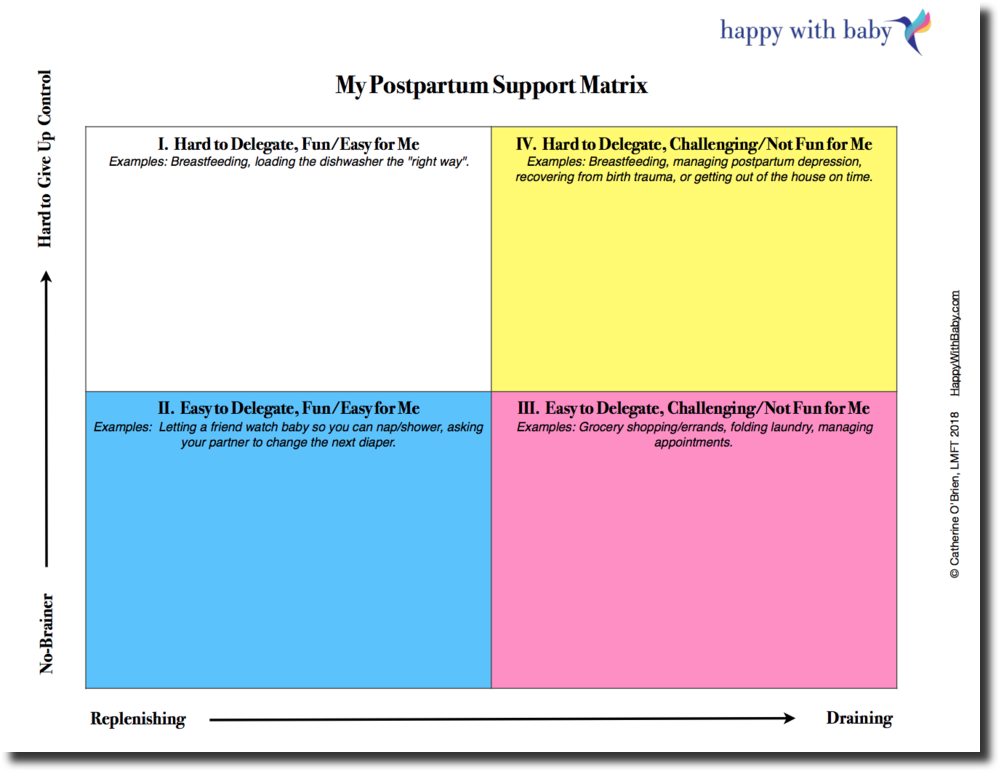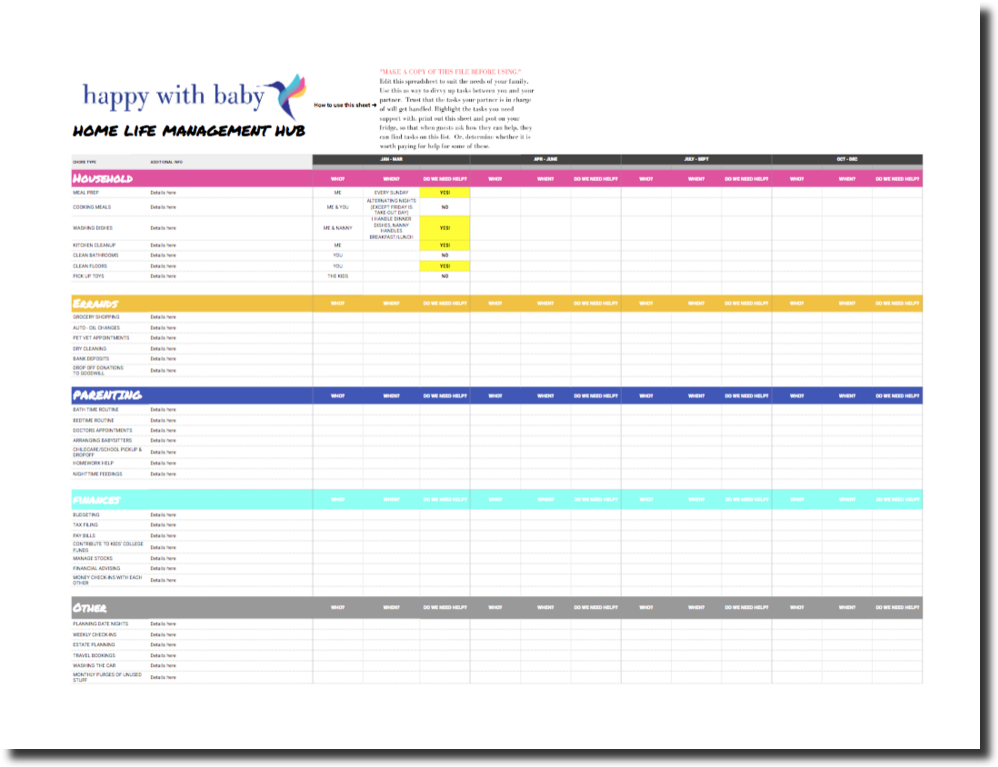How to Start Asking for Support When You Don't Even Know What to Ask For

Are you a new mom or dad that feels like you’re doing too much and can’t keep up?
Are you so overwhelmed or exhausted that you can’t even think of what to delegate when people ask how they can help?
Or, maybe asking people for help just feels too hard, but you’d love to try to let yourself off the hook a little?
I get it. Completely.
For one thing, as a mom, I’ve been there myself. For another, this is something that comes up in my therapy practice ALL the time.

That’s why I created two tools that can help. You can download both of them below.
I recommend starting with the Postpartum Support Matrix first, and then once you’ve worked through it, using my Home Life Management spreadsheet will feel like a piece of cake.
(If you feel like you already know what needs done and who is handling what, you can jump ahead to the spreadsheet without using the Matrix first.)
To make it all clear and easy to complete, this week I made a video to show you how to use the Postpartum Support Matrix worksheet. And stay tuned for next week, when I’ll be walking you through the Home Life Management Spreadsheet too.
So, scroll down to download your free tools and watch the video. The transcript is always included as well.
And if any lingering questions come up while working through the worksheets on your own--maybe you’re not sure where to put a certain task or are having a hard time deciding how to troubleshoot something, don’t hesitate to reach out to me. I’m here to help.
Get your FREE Support Matrix & Home Life Management Spreadsheet here:

Are you so overwhelmed that you don't even know what you need help with or what you want your role to be?

Are you ready to start delegating and making sure things get done, but need a place to manage it all?
Then, check out the Support Matrix "How To" video here:
https://www.youtube.com/watch?v=eQ6ml8K1NBA&w=854&h=480
Ready for the Home Life Management Hub spreadsheet tutorial too? Watch it here.
VIDEO TRANSCRIPT:
Are you a new parent, an expecting parent, or maybe you've even been a parent for a while and you're feeling overwhelmed with all the changes that you've been experiencing as a new parent, and you know you need and you really want help, but you're not even sure what to ask for?
I'm Catherine O'Brien at HappyWithBaby.com and that's why I put together this postpartum support matrix, along with my home life management spreadsheets. And the video today that I that this is going to be about is my postpartum support matrix, so that you and your partner can explore together and identify the areas where you're both struggling and maybe the areas where you can get a little bit more help.
And stay tuned because I'll also be shooting a video about my home life management spreadsheet as well and that will be coming up soon. So let's take a look at my postpartum support matrix here. I'm going to my screen.
OK so here's the postpartum support matrix and, as you can see, there's four squares. That's the matrix. And on the left here are the things--on the left side are the items that are more replenishing and the ones on the right can tend to be more draining for us.
And so if you and your partner are both filling this out, you might have totally different things in each of the squares and that's totally fine. It can actually be helpful in determining what things that you can be doing and what things they can be doing, and then what things that you either need to delegate out or ask for help.
OK and so then, the items on the bottom are kind of like the no-brainer, they're easy to do easy to delegate maybe and then the other ones on top are the things that are definitely a lot harder to give up control and so depending on our personality sometimes there's--we might have more things that are hard to--harder to give up or harder to delegate, but that's okay too.
So let's look at this first box, the white box here.
Yeah the white box here is it's these are things that are hard to delegate, but maybe they're fun and maybe they're easy for me, so the examples we have here are breastfeeding. And, that--maybe that is not fun for you. That might be, you know, in yellow or pink as well. Like maybe you're really struggling that's an area--that's okay. Nobody has the same answers in each box, what I find.
Or maybe you--like I have loading the dishwasher "the right way", like some people I talk to, like they have a certain way they like to do things, so having other people do them for them is almost more frustrating or more overwhelming because they just, it's just so frustrating to see things not in the order they want to be. But this might also be the time that you look at those things and decide, you know what, I can let that go. It doesn't have to be that way right now. And especially if you're in the early stages and you just had your baby, like let some of those things go. You can get back to the normal and the way you like them now, but if you can get some extra help and the things get done, maybe try to decide like, okay, like I can let this go right now. Like maybe I could have gotten 10 more dishes in the dishwasher, but I didn't have to load it and I didn't have to wash them, so I'll just let let that go.
This is really helpful because it can, as a new mom or a new dad, kind of help you explore and identify what your new role is as a parent. What are the things that you want to be doing or, you know, maybe some things that you aren't sure of, so make sure when you're filling out this box that if it's overloaded, like everything's in that box maybe is what yeah so one of the things if you're finding that everything's in that box you really should probably try to let go and delegate some of those things and relinquish some of the control, even like I said if it's just for a brief period of time.
OK, so then let's look at box number two. It's the blue box.
And these are the easy to delegate or they're fun and easy for you. And some examples might be letting a friend watch your baby, so that you can take a nap or shower. Now, that's easy for some people but it's definitely not easy for everyone. I know some people that really struggle to have anyone watch their baby especially early on. Or it could be asking your partner to change the next diaper. Again I know some people struggle with that, especially if the baby can get kind of fussy and they feel like they want to go in and take control and do themselves. These are definitely things you know to step back and say, you know, let them let them also try to figure out what they need to do.
This is also usually the box that is a good place to kind of start with delegating things. They can be the things that you're okay letting other people do because maybe you don't care what the dishwasher looks like when people put the dishes in, so you're like, yeah, go ahead and fill the dishes or the dishwasher for me or go ahead and wash the dishes, go ahead and fold my laundry. I don't have a specific way I do, I fold my clothes. I don't care as long as they're clean and folded and I don't have to do it, then I don't I don't care what it looks like. That could be you. So it's definitely different for everybody. And these kind of like seem like small or insignificant things, but they can really add up when you're also, you know, taking care of your baby and you have to feed your baby and there's a lot more needs and you're exhausted and stuff like that. And I find that we kind of like move slower and everything.
These are definitely easy things to just get off your to-do list that you won't have to do and don't have to hold them like hold them all inside. And like you know, it's one of those things, it's like, I have all these things on my list and I don't even know where to start. These can be those things that are easy to start and get that support, and also can help you to feel connected because people like to help us too, right. And so, you probably have had people ask like, "Oh let me know what you need me to do." Well these are those things that you can let people do for you. I always encourage my couples that I work with when I do my workshops is to, you know, create a list of all the things you're okay having people do. And when they come over or when they call you and they say, "Hey how can I help you?" And you're not sure maybe you struggle to ask for help, you could say, "Well this is my list of to do's, like is there anything on here you're okay helping me with? Or is anything--would you mind doing any of these items?' And you know a lot of times, they'll just be like, "Yeah, let me know. What is it?" So, and they'll just start like checking them off for you. And you might end up with like no list by the time they're done.
So definitely let people know if they want to help you, and this can be a good place to start with that, especially if you struggle more. And I know, I know I work with a lot of moms that we really struggle asking for help. And also I think we need to listen when somebody says, "Oh what can I do to help you?" is to say, "Oh this is what I need help with," you know. So when they ask you, give them something and I know it can be hard and so if you kind of have that list together ready to go, it can make it easier so we only have to think about it, right, because we're exhausted. And I always call it like, you know, they call it "decision fatigue". I always think about that as like that overwhelm fatigue. Like I can't even think of what I need, so this is that's a good place to start there in the blue box.
So then box number three is the pink box.
And these are they easy to delegate, but they're challenging and they're not they're not fun for you. So this can be maybe grocery shopping or errands it could be folding laundry. It could be, you know, managing appointments. And these are the things that sometimes it can be easy--you can find some technology to do them. Like this could be where you do automatic bill pay or you can set up your grocery shopping list, and then you just order them and have them delivered, or you go and you pick them up at the grocery store. I just did a video recently on a app that I love and it's called emails and it's it makes your--gives you recipes and you can choose your meals for the week, and then it makes your shopping list and either you can go shopping with that list or you can go and order through instacart.
And so this would be good where you could send your, your shopping list to like a friend or a family member and then they could do the shopping for you. Or you can have it for your partner and then they know what to buy at the grocery store. It's very specific. And then, you know, you come home and someone can put the groceries away or whatever and that could be an easy way to do it. And so sometimes these things might cost a little bit more money to manage, but in the long run they could save a lot more time, a lot more. It could alleviate some stress and plus it's things like that aren't fun to do.
Or maybe you can even trade like services or something with another friend. Like if they're like, "Hey, we're going to the grocery store." Great. They pick up your groceries. You maybe you're running errands at Target or something and you pick up stuff for them. You know, sometimes that could be a helpful way to, or you know, you have your, you know, a family member or friend come over and fold that laundry or that type of thing. So definitely if you're feeling overwhelmed, like let's get some of these things that are on this list off off your chart--so let's get some of these things off your list, so that you can definitely decrease your overwhelm. So alright.
So then in the yellow box, now this is definitely probably where the more difficult things come in.
And these are really hard, hard things to delegate because you have to do them, but then they're also not fun for you. So this is again where like breastfeeding can be, like it's not easy for everybody, right. There's challenging, challenging aspects of it. Or maybe you're struggling with postpartum depression or postpartum anxiety. Or maybe you have had a traumatic birth or you had a c-section or you're just having difficulties, like even getting out of the house. Like figuring out like how to like care for your baby and do all the things that you need to do.
Now we definitely need to troubleshoot these challenges because we have to figure out like how to get them them done and how to how to deal with them because if they go untreated or un-taken care of can just create and cause more struggles in for yourself but in your relationship and moreso. So we definitely need to figure out what those solutions are and these are typically the things in this box aren't typically not the things that are solved by someone folding your laundry, right. Like these are things that you have to take care of, you and your partner have to do together and you need extra support to manage them.
So do you need to call a lactation consultant? Or visit you know a La Leche League group? Usually there's some in the area, you know. Or maybe you need to give yourself permission to use a bottle or pump or whatever it is and get that support around there. Or if you're struggling with postpartum depression, do you need to talk to your doctor? Do you need to get a referral to see a therapist? One of the best resources out there is postpartum.net, which is the website to Postpartum Support International and they have volunteers around the world that will help. Hopefully there's one in your area. If there's not, there's definitely volunteers to help you find the resources or support that you need and they do have a lot of online services. So definitely check them out if you, you know, you're definitely struggling and you're like, "this is not what I thought parenthood would be" because both moms and dads can struggle with postpartum depression anxiety, and OCD, postpartum stress disorder, I'm sorry not post-partum, post-traumatic stress disorder, if you had a traumatic birth, postpartum psychosis.
So definitely those are things you don't want to wait to get the help. Those need to be taken care of and the sooner you get help, the sooner you can start feeling better and getting getting to what's important, right. And so definitely we need to be taking care of ourselves, our relationship, and our our baby, so managing that definitely will help you get back to it.
So I hope this video was helpful. I hope you can use this as a guide to figuring out where, you know, where you can start asking for some help. And I'd love to hear what you have used and if you've used matrix, how it's helped you in your relationship, in your family.
And you know, maybe there's an area there like, "Oh I'm really struggling with, I wish you would talk more about this", let me know because I'd be happy to do more in-depth and talk more about where to get support or some things you can do to kind of manage that.
And then I also want you to stay tuned for my video on my, I want you to also stay tuned for my home life management spreadsheet video that I'll be doing because this will kind of help break down some of these things and start looking at how we can delegate them and how we can start managing all the things that we have to do. Because I feel like prior to having a baby, things are easier because we kind of can get things done and, you know, nothing technically gets in the way--and not that the baby gets in the way, but just that it can be more challenging to find the time and find the ways to do it. So that's that's what that spreadsheet will be about.
So we'll talk more about that, but you can download both items from my website now. You don't have to wait for it.
So until next time, you guys, take care.
Subscribe
Sign up to get the latest weekly blogs sent straight to your inbox


0 comments
Leave a comment
Please log in or register to post a comment